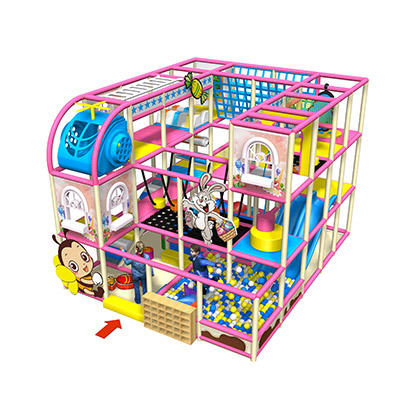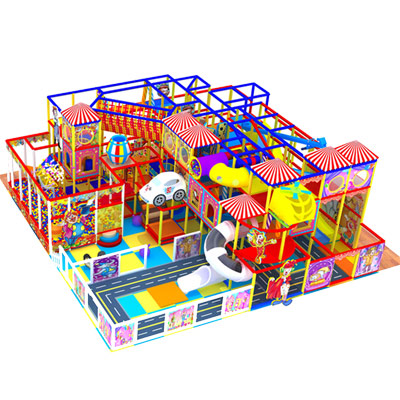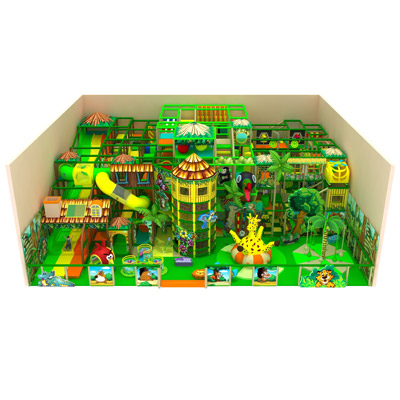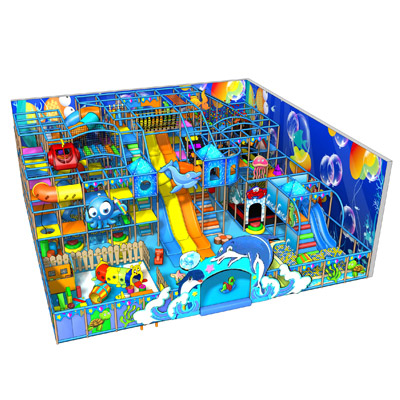What is the age group for inside playground equipment?
As parents, guardians, or simply enthusiasts of play, one of the most commonly asked questions concerning inside playground equipment is: "What age group is it designed for?" The answer is extensive, which may surprise some people. Inside playground equipment, designed with precision and consideration, caters to a broad age spectrum from as young as 1 year old, traversing through various developmental stages, all the way up to 12+ years. Indeed, with the evolving nature of play and design innovation, many indoor play areas are now accommodating to teenagers and adults, making it a family-fun experience.
1.Introduction:
The inside playground equipment is suitable for children from 1-12 years old and above, and even adults. Additionally, Choosing equipment tailored to the specific age group minimizes potential dangers, offering parents and caregivers peace of mind. When tailored to the right age group, this equipment plays a pivotal role in promoting both physical and mental development.
As we delve deeper into this topic, we will uncover the nuances of designing playgrounds for each age group, emphasizing how inside playground equipment is more than just a tool for play—it's an instrument for growth.

2.What kind of inside playground equipment is suitable for children of different ages?
When designing or choosing equipment for an indoor playground, understanding the developmental stages and needs of various age groups is essential. Each age group has specific requirements and preferences, which can be met with tailored equipment. Let's delve into the perfect inside playground equipment for each age range:
A: Toddlers (Ages 1-3) ——Embracing the Basics
The youngest members of the playground demographic, toddlers are exploring the world in earnest, testing out their newly-found motor skills and balance. For these eager learners:
●Soft Play Areas: These cushioned zones offer a safe place for toddlers to roam, crawl, and take those initial steps. It also helps them familiarize themselves with different textures and surfaces.
●Small Slides: Perfect for the little ones, these slides aren't too high and have a gentle incline, ensuring that even the most tentative toddler can experience the thrill of a slide.
●Gentle Swings: A gentle back-and-forth motion not only delights but also helps with balance and spatial awareness.
●Sensory Boards: Stimulating their sense of touch, sight, and sound, sensory boards are interactive panels that foster cognitive development.

B: Preschoolers (Ages 3-5) ——The World of Wonder
Preschoolers are a bundle of energy, brimming with curiosity and a blossoming imagination.
●Complex Climbers: With their enhanced motor skills, they are ready for climbers that challenge them a bit more, whether it's a tiny rock wall or a rope ladder.
●Themed Playhouses: At this age, imagination runs wild. Playhouses, whether they're pirate ships, castles, or space rockets, offer a setting for imaginative play.
●Beginner’s Balance Equipment: Beam walks or stepping stones help them develop balance and coordination.
●Imaginative Play Areas: Spaces with props or costumes allow for role-playing, expanding their creative horizons.

C: Early School Age (Ages 5-7) ——Discovery and Adventure
Physical and cognitive growth spurts characterize this age. They seek adventure and challenges.
●Tunnels and Mazes: These features can be a source of endless fun, igniting their problem-solving skills as they navigate through.
●Moderate Slides and Swings: Slightly bigger and faster, these elements match their increased physical capabilities.
●Simple Obstacle Courses: They can jump, climb, and crawl through these courses, pushing their physical limits in a safe environment.
D: Older Kids (Ages 8–12+)—— Mastering Skills
Armed with independent cognitive abilities, older kids are up for more sophisticated challenges.
●Advanced Climbers and Jungle Gyms: These structures offer various challenges, from monkey bars to complex rope courses.
●Strategy-based Play Equipment: Board games, puzzles, or electronic games that challenge their minds.
●Team Play Areas: Ball pits, basketball hoops, or even mini soccer fields promote teamwork and sportsmanship.

E: Adults—— Weekend Relaxation
For many adults, playgrounds offer a mix of nostalgia and genuine fitness opportunities.
●Trampoline Parks: A great cardiovascular workout, trampolines are fun and energetic.
●Climbing Walls: These challenge both the body and mind, offering varying levels of difficulty for both beginners and pros.
●Ziplines: Ziplines provide an exciting rush and a distinctive viewpoint.
●Ninja Courses: These challenges, which are modeled after obstacle course racing, put agility, strength, and endurance to the test.

In conclusion, inside playground equipment can be tailored to suit every age group. By ensuring the equipment matches the developmental stage of its users, inside playground equipment can provide a safe, fun, and beneficial experience for all.
3.How to Ensure the Safety of Different Age Groups When Playing: Perspectives from Customers and Businesses
From the Customer's Perspective:
A:Supervision:
For younger children, they should always play under the watchful eyes and supervision of an adult. They might not be fully aware of certain risks, necessitating guidance from a responsible adult.
B:Adherence to Safety Rules:
Regardless of age, every participant should strictly adhere to the safety rules of indoor playgrounds, ensuring both their own and others' safety.
C:Proper Equipment Use and Understanding:
Ensure you understand and follow all instructions and safety regulations related to inside playground equipment use. If safety gear, such as helmets or knee pads, is provided, it must be worn correctly.
From the Business's Perspective:
A:Clarify Target Age Group:
When designing and planning an indoor playground, businesses should first identify the age bracket of their target audience. This ensures the acquisition of appropriate inside playground equipment tailored to that age group.
B:Appoint a Safety Officer:
Having a designated safety officer or team ensures that every nook and cranny of the indoor playground is thoroughly monitored and potential safety issues are addressed promptly.

C:Regular Maintenance and Inspection:
Periodic maintenance and inspection of all facilities should be conducted to ensure they remain in optimal and safe condition.
4.Benefits of age-appropriate inside playground equipment
The items that are suitable for players of different ages are described above. So why should different age groups correspond to different amusement projects? Because these devices can bring certain benefits to children. Let's explore the advantages of age-appropriate equipment one by one.
Promoting Physical Development: As children grow, their physical needs change. A toddler, for example, needs equipment that aids in walking and balance, while older kids benefit from apparatus that helps improve muscle strength, flexibility, and coordination. Age-specific inside playground equipment ensures that children get the right physical challenge they need.
Enhancing Cognitive Growth: Play isn’t just about physical activity. Kids learn a lot through play. Younger children benefit from sensory boards that stimulate touch, sight, and sound, helping in brain development. Older kids, meanwhile, benefit from equipment that fosters problem-solving, such as mazes or strategy games.
Fostering Social Skills: Age-appropriate equipment encourages kids to engage in group activities that are suitable for their age. For example, themed playhouses for preschoolers promote role-playing and cooperation. Older kids can engage in team sports or group challenges, learning about teamwork, competition, and leadership.
5.Dreamland: Setting the Gold Standard in inside playground equipment
Choosing a suitable indoor park supplier is very important. It can not only help you choose the indoor park plan that suits your concept but also provide indoor park equipment for various ages.
At Dreamland, our ethos is simple: Every child deserves the right to safe, developmental, and joy-filled playtime. With years of industry experience and a keen understanding of children's evolving needs, we have crafted a range of inside playground equipment that caters to every age bracket, from the tiny tots taking their first steps to the older kids seeking thrilling adventures.
Our commitment to safety is unwavering. Each piece of equipment undergoes rigorous testing to ensure it's up to international safety standards. But beyond safety, Dreamland takes pride in creating innovative designs that stimulate both mind and body, fostering holistic child development. By choosing Dreamland, caregivers, schools, and recreational centers are not just picking an inside playground equipment supplier; they're partnering with a team dedicated to enriching the play experiences of children, ensuring they grow, learn, and thrive in the most engaging environments.

6.Conclusion
The landscape of inside playground equipment is as vast and varied as the age groups it caters to. Recognizing the unique needs and developmental stages of each age bracket ensures that playgrounds become more than just places of amusement—they transform into arenas of growth, learning, and holistic development. Dreamland's unwavering commitment to this vision is reflected in every piece of equipment we design and provide. By prioritizing safety, innovation, and age-appropriateness, we champion the belief that every child, teen, and adult deserves a play experience that's enriching, engaging, and above all, safe. As society continues to understand the profound impact of play on development, it is our collective responsibility—be it as parents, caregivers, or playground providers—to make informed choices. With the right equipment tailored for each age group, we pave the way for generations to not only play but to thrive.











